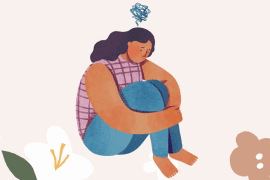It has taken many years, therapy, and several great books to learn that I don’t have to say yes to everything people ask of me.
Most recently I was reminded of the importance of boundaries while reading Brené Brown’s The Gifts of Imperfection. In it, she points out that being ourselves wholly and joyfully requires boundaries: “Choosing authenticity means cultivating the courage to be imperfect, to set boundaries, and to allow ourselves to be vulnerable.”
When we don’t have much practice setting boundaries in relationships, we may find it uncomfortable to do so with our children. In this way, and myriad others, our children can be our teachers. Let’s say your two-year-old wants a cookie right before bed, but you know it will be disastrous if you give in. Your toddler is teaching you how to say no, and the more you practice the better you are and doing it.
Suggested reading: The Gifts of Imperfection.
-
Asking for help
In The Gifts of Imperfection, author Brené Brown explains to her daughter, “I think asking for what you need is one of the bravest things that you’ll ever do.” I think this is true. Women are often socialized to appear self-contained and independent while being careful not to inconvenience anyone else. We’re supposed to have it all and do it all without asking for help. When we internalize these expectations, which many of us have, we are often left feeling unsupported and unfulfilled.
Here’s the truth: as a species we’re innately dependent on one another for survival. Our health and happiness are contingent on our interconnectedness. Asking for help isn’t a sign of weakness, and the alternative is often resentment and rage. When we ask for help, we are able to devote ourselves more fully to the things that matter most to us. In contrast, when we try to do it all we run the risk of stretching ourselves too thin while we do more things less effectively.
Suggested reading: How to Ask For Help.
-
Self-care
I’m not sure there’s a parent of young children alive who doesn’t struggle with this daily. Children need so much from us, and they don’t tend to limit these needs to normal working hours. If we aren’t intentional about taking care of ourselves, we can go hours without a snack or a bathroom break. Needless to say, meeting our basic needs can be a battle.
More than making sure we’re fed and rested, though these are certainly crucial to our health and sense of balance, I see self-care as the engagement in that which makes us come alive. What replenishes your depleted cup? What makes your eyes light up? What energizes you? That thing, whatever it is, deserves to be acknowledged. You owe it to yourself to cultivate that passion before it withers away. It might be something small like making time for a regular tennis game, or it could be big and scary like a new career path. Whatever feeds your soul also makes you a better parent. As Rob Bell reminds us, “The greatest gift you can give your kid is to be fully alive yourself.”
Suggested reading: How to Be Mindfully Self-ish – and Why It’s SO Important.
Change requires awareness, intention, and vulnerability. Sometimes it’s painful, and it’s seldom a linear process. The evolution of becoming the best version of yourself can feel messy, but it’s also beautiful. And entirely worth it.
Megan Stonelake is a therapist and parent coach who teaches parents all over the world how to become more peaceful. She has written extensively on peaceful parenting for Parent.co, Hey Sigmund, and The Huffington Post among others. You can follow her blog or schedule a session at her website. You can also follow her on Facebook and Twitter.










